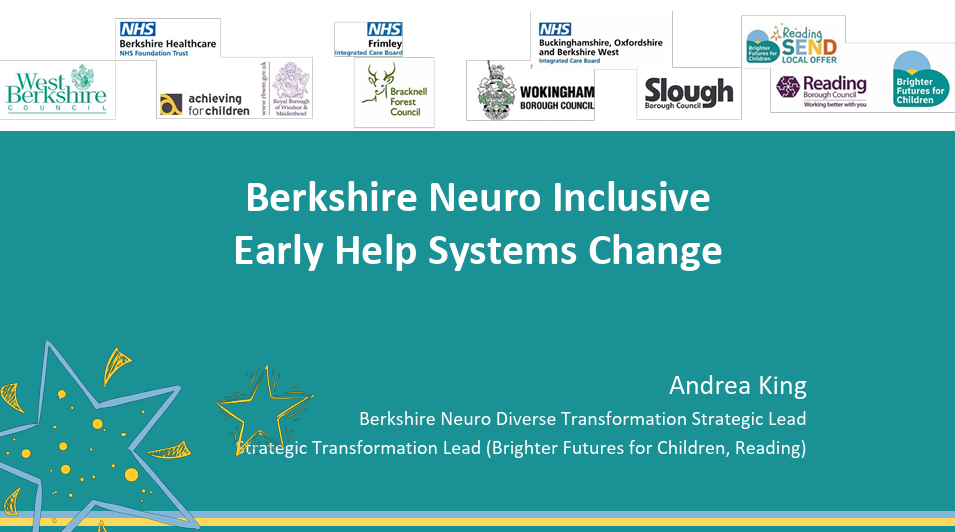Thank you to everyone who joined us on Monday 7th July to hear the update from Andrea King (Strategic Lead for Berkshire Neurodiverse Transformation) and Miranda Walcott (Designated Clinical Officer for Special Educational Needs and Disabilities (0-25) Buckinghamshire, Oxfordshire and Berkshire West Integrated Care Board) about the Berkshire-wide Neuro Inclusive Early Help System Transformation Programme.
Andrea shared updates on the plans to identify and support neurodivergent children and young people earlier across Berkshire and there was an opportunity for families to ask questions, share their views and help shape a system that works for children, young people, and families in Wokingham Borough.
The Slides from the session are available here: Rethinking Early Support for Neurodivergent Children & Young People
The notes and Q&As from the session are here: Berkshire Neuro Inclusive Early Help System Change July 7th
You can also read a blog from Andrea here:
This last year has been spent listening often, and with care, to the lived experience of our children and our families with SEND.
As I’ve sat and listened to many families and to many children who’ve taken time to explain how it feels to ask for help and support, one shared experience has stood out particularly – the time it is taking to understand neurodivergent strengths and needs. We have a very high volume of children in Berkshire West (Reading, Wokingham and West Berkshire) waiting to see a clinician to understand their neuro divergent characteristics and that leads to long waiting times.
With NHS colleagues, we have sat side by side with young people and caregivers, and also with all of our Headteachers and SENCOs. Our schools tell us clearly that until they can understand the neurodivergent characteristics of a child, it’s really hard to know how to adapt their environments to support children better. Families tell us that to wait for a long time to see a clinician only to be told that you’ve been waiting in the room part of our system of help, is incredibly challenging.
And so, it’s time we change.
In Berkshire, we have agreed to work together differently. Our six Berkshire Directors Children’s Services; our Directors from Buckinghamshire, Oxfordshire and Berkshire West & Frimley Integrated Care Boards (ICBs); and our Directors from Berkshire Healthcare, have agreed to work together to change the system in Berkshire. This change will be co-designed with our families from the outset.
We want to introduce evidence-based practice ‘screening’/’strengths and needs’ tools that are well developed elsewhere in the country, which will enable many of our partnership workers (including schools and settings) to understand the neurodivergent characteristics of our children. These tools allow us to understand what adaptations we can make to support our children at home (as parents and carers); in schools, early years and further education settings; and in the community. These tools also help us identify whether the presenting needs of a child are related to neuro divergent characteristics, we recognise for example, that our children with complex trauma often present similarly and can end up in our neuro diagnostic pathways inappropriately. We must change this.
This approach still enables access to diagnosis for those children that need it, but it also moves our focus to responding to a child’s need and strengths at the earliest opportunity, rather than focussing on diagnosis.
On the 27th June, families from our Wokingham Parent Carer Forum and the other parent/carers forums across Berkshire sat side by side with Headteachers, SENCOs,NHS leaders, early help, social care and many other colleagues, to look at evidence based national practice and to make a decision on which approach we prefer. And, crucially, how we might adapt this approach to be right for Berkshire and respond to what our children and our parents/carers have told us they need.
This is a big change, it will be complicated, at times we will disagree with each other – it will require patience and an unrelenting focus on improving outcomes for our children.
We know our children needed this yesterday – when with my colleague Miranda Walcott (our Designated Clinical Officer from the NHS) we sit and talk with older SEND young people in Berkshire West, our young people tell us they wish they’d had this support years ago. Usually changes like this take about three years to implement, we’re aiming to introduce this approach in half that time, in a year and a half, we recognise that this is ambitious.
If you are interested in getting more involved, please don’t hesitate to reach out to your local parent carer forum: https://www.sendvoiceswokingham.org.uk/
We’ll come back to you in a future blog to let you know how we’re getting on, but in the meantime, I leave you wit the words of some of our children:
‘Waiting (for ND diagnosis) felt like a dark hole’
‘We need this (needs/strengths approach)'
‘I needed this (needs/strengths approach) when I was younger. It would have really helped me’
Take care everyone, we’ll keep in touch,
Andrea




